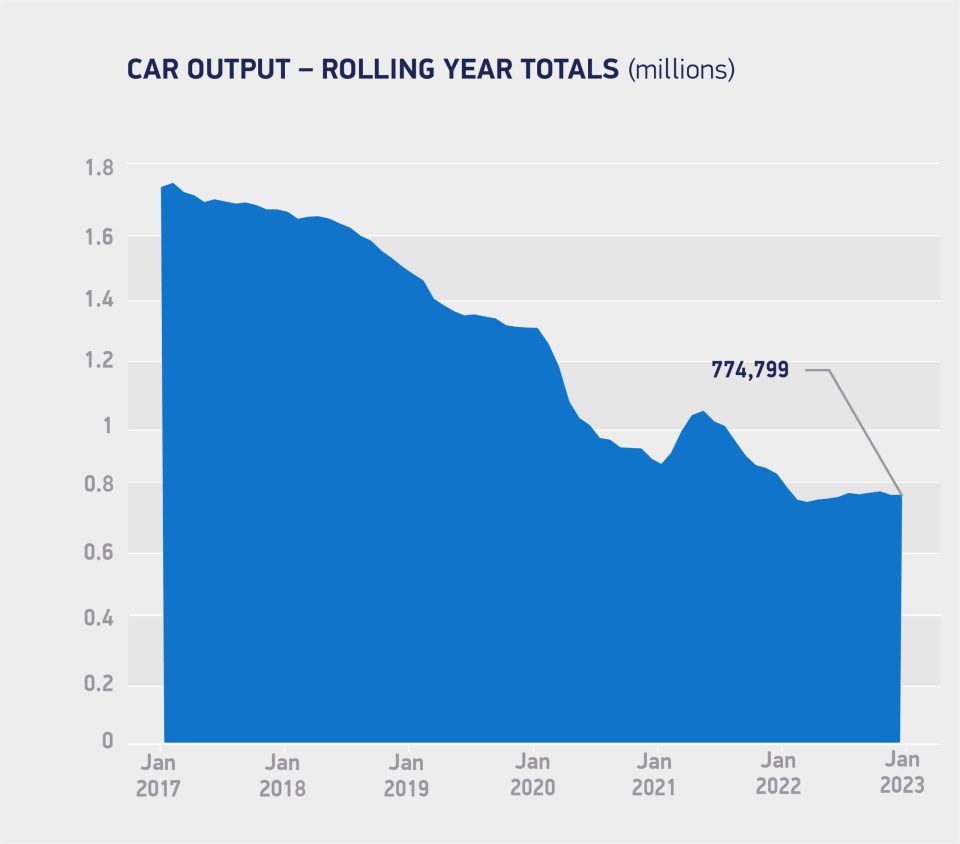Motor boss warns against ‘protectionism’ as electric vehicle production accelerates 50 per cent

Car production in Britain fell slightly in January as thousands continued the shift towards electric vehicles which experienced a near 50 per cent increase.
Despite global economic instability, car production fell just 0.3 per cent last month, which was welcomed by the industry as a sign of market stability.
The Society of Motor Manufacturers and Traders (SMMT), lastest figures show that output of new vehicles totalled 68,575 units, a fall of 215 on the previous month.
It added that the shift is evidence of the UK’s ability to produce EVs to sell abroad, despite the SMMT also reporting there had been a 1.5 per cent decline in output for export.
Manufacturers have also shifted away from petrol and diesel, with 28,329 electric cars being purchased, an increase of 49.9 per cent.
The jump, which includes combined battery electric, plug-in hybrid and hybrid electric vehicles, represents 41.3 per cent of cars made in January, which is almost a record monthly share.
The SMMY said there are about 40m vehicles on the road in the UK, with around 774,000 produced each year – well down from more than 1.5m in 2017. As of 2021, it was a more than £60bn industry.

Despite the optimism however, the SMMT’s chief executive warned against “increasing protectionism which, if not challenged or mitigated, could put the UK at a disadvantage” on the global stage.
SMMT said the slight drop was due to structural changes, as the industry changed from car to van making at one major plant. It added that supply chain issues still affected some manufacturers.
Domestically, the figures show volumes in the UK market are healthy, up 5.6 per cent.
“Automotive manufacturing can drive long-term growth for the low carbon economy but the sector needs competitive conditions to attract investment”, said Mike Hawes, SMMT’s chief executive.
“Recent global developments, however, suggest increasing protectionism which, if not challenged or mitigated, could put the UK at a disadvantage.”
“To deliver a wholesale industrial transformation we need a competitive framework and a pitch that promotes advanced vehicle manufacturing internationally. We now look to the forthcoming Budget for the necessary measures that will enable the automotive sector to deliver its undoubted potential.
Meanwhile, Hugo Griffiths, consumer editor at carwow said: “With instability rampant around the world and building cars being one of the more globally integrated and complex endeavours going, the fact UK production remained stable in January 2023 compared to the same month last year is welcome news.
“Few will be celebrating, true: current predictions hold that we will manufacture 842,000 cars this year, up nine per cent on 2022, but a far cry from the halcyon days of 2016 when we built over 1.7 million.
“The right models are certainly being made here, though, with two fifths of all production last month being hybrid or electric cars, up almost 50 per cent on January 2022.”
